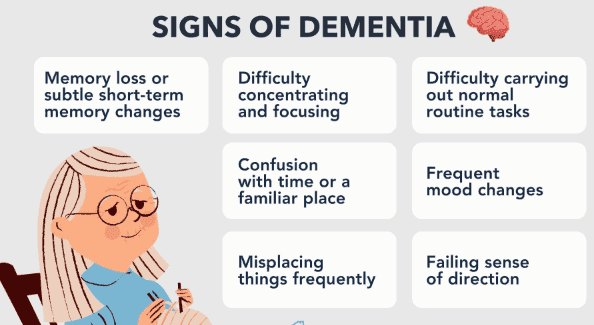Recognizing Signs of Dementia in Your Loved One
Published on September 15, 2023
Updated on May 17, 2024
Published on September 15, 2023
Updated on May 17, 2024

Table of Contents
Dementia is a condition that affects cognitive abilities such as thinking, remembering, and reasoning. It is crucial to recognize the signs and symptoms of dementia early to provide proper support. This article will help you understand the common signs and symptoms of dementia and the steps you can take to address them.
It is important to note that some treatable medical conditions can cause dementia symptoms, so it’s essential to determine the cause. Nutritional deficiencies, thyroid problems, low blood sugar, and problems absorbing vitamin B-12 can develop dementia-like symptoms or other personality changes. Many different conditions can cause symptoms of dementia, including some that are reversible, such as thyroid problems and vitamin deficiencies. Therefore, you must consult a doctor for a complete assessment if you notice any signs and symptoms of dementia.
In conclusion, recognizing early signs of dementia is vital for seeking timely support. Consult a doctor if you notice these symptoms in your loved one. Joining support groups and accessing the provided resources can help families navigate the challenges of dementia caregiving.
How to Convince Your Loved One to Seek Help for Dementia
What Are Some Early Signs or Symptoms That a Person is Living with Dementia? (video)
10 Early Signs and Symptoms of Alzheimer’s and Dementia
The 10 warning signs of dementia
What Is Dementia? Symptoms, Types, and Diagnosis
Understanding Dementia (Alzheimer’s & Vascular & Frontotemporal & Lewy Body Dementia) (Video)
How Do I Know Which Dementia I’m Looking At? (Video)
Dementia Training material (Free)
Promoting Meaningful Relationships with Dementia Patients through Validation Therapy
Unlocking the Power of Validation Therapy in Compassionate End-of-Life Care
Validation Therapy: A Valuable Tool for Families and Healthcare Teams
Best Practices for Approaching Combative Dementia Patients
Dementia Insights: The Validation Method for Dementia Care
As an Amazon Associate, I earn from qualifying purchases. The amount generated from these “qualifying purchases” helps to maintain this site.
As an Amazon Associate, I earn from qualifying purchases. The amount generated from these “qualifying purchases” helps to maintain this site.
How Do I Know You? Dementia at the End of Life
Sundown Dementia, Vascular Dementia and Lewy Body Dementia Explained
Ahead of Dementia: A Real-World, Upfront, Straightforward, Step-by-Step Guide for Family Caregivers
Dementia Care Companion: The Complete Handbook of Practical Care from Early to Late Stage
Trivia Games – Caregiver Activities for Alzheimer’s and Dementia
As an Amazon Associate, I earn from qualifying purchases. The amount generated from these “qualifying purchases” helps to maintain this site.
Dementia Caregiver Essentials: Comprehensive Guide for Dementia Care (one book that contains the ten books below for less than one-third the price of all ten)
Holistic Nurse: Skills for Excellence book series
Dementia Home Care: How to Prepare Before, During, and After
Atypical Dementias: Understanding Mid-Life Language, Visual, Behavioral, and Cognitive Changes
Fading Reflection: Understanding the complexities of Dementia
Ahead of Dementia: A Real-World, Upfront, Straightforward, Step-by-Step Guide for Family Caregivers
Four Common Mistakes by Caregivers of Loved Ones with Dementia and What Do Differently (video)